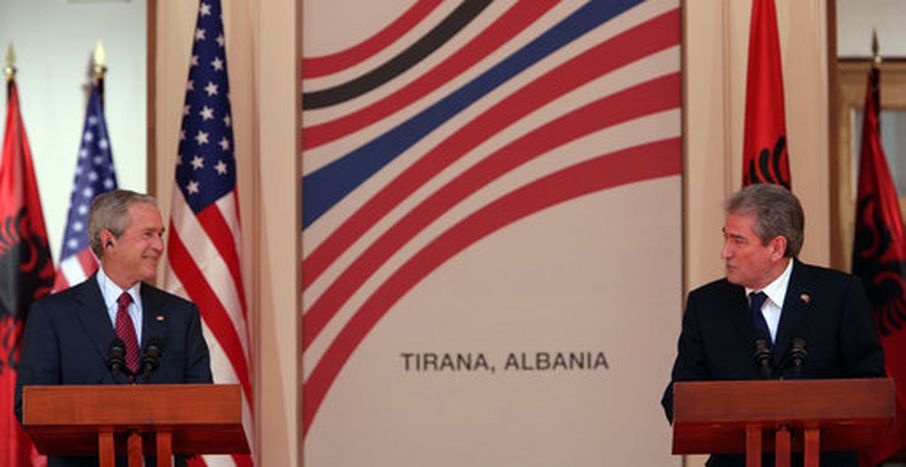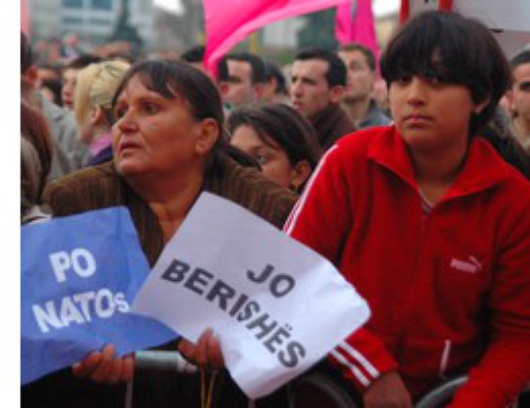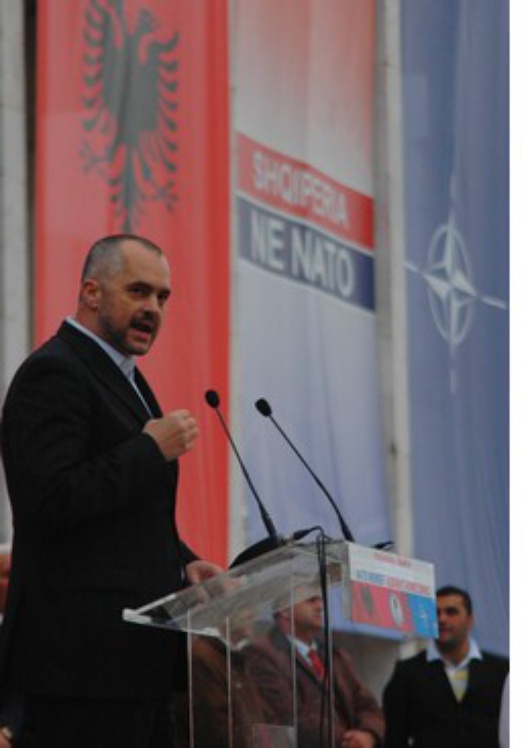
Albania: 'Nato yes, PM Berisha no!'
Published on
Translation by:
Cafebabel ENG (NS)Whilst Tirana celebrated an invitation to join the Nato alliance alongside Croatia on 2 April, the opposition mobilised itself to denounce the government
Albanian prime minister Sali Berisha spoke of a ‘historical moment’ when his country finally received its longed-for invitation into the NATO military alliance action plan on 2 April, the first day of the two-day long Nato summit in Bucharest. Albanians would finally ‘come back into the family of Euro-Atlantic nations.’
However, as a pop concert was being set up to celebrate on 4 April, more than ten thousand people got together to protest with the Albanian socialist party. Amidst slogans such as Nato yes, Berisha no, the government received a hit after they allegedly lied about the army depot blasts in an arms cache close to the Albanian capital city of Tirana, which killed at least seventeen people on 15 March.
Before the summit’s official opening, the Albanian  media had reported on the catastrophic work conditions, illegal weapons trade and corruption in high circles that were impeding their country. The opposition demanded a full explanation and resignation from former president Berisha, who was held responsible for the tragedy. The incumbent was not in the position to put the necessary values and principles for Albania’s integration into west European structures, went the socialist accusation.
media had reported on the catastrophic work conditions, illegal weapons trade and corruption in high circles that were impeding their country. The opposition demanded a full explanation and resignation from former president Berisha, who was held responsible for the tragedy. The incumbent was not in the position to put the necessary values and principles for Albania’s integration into west European structures, went the socialist accusation.
Long way to Europe
 After the century-long partition from the west and from the east since 1991, every democratic party equates Albanian democracy with the return to Europe, and thus with integration into western structures. Albania has been part of the Council of Europe since 1995, and first applied for Nato membership in 1994. Tirana has emphasised its wishes for western integration through its military engagement in Afghanistan and Iraq, where around 280 soldiers are currently deployed. After the invite they received in Bucharest alongside Croatia, they will perhaps have to wait up until a year to be full-time Nato members. Unlike others west European Nato member states, there is hardly any criticism of the military alliance. Albania becoming a Nato member was part of a broader social consensus which every party agreed with.
After the century-long partition from the west and from the east since 1991, every democratic party equates Albanian democracy with the return to Europe, and thus with integration into western structures. Albania has been part of the Council of Europe since 1995, and first applied for Nato membership in 1994. Tirana has emphasised its wishes for western integration through its military engagement in Afghanistan and Iraq, where around 280 soldiers are currently deployed. After the invite they received in Bucharest alongside Croatia, they will perhaps have to wait up until a year to be full-time Nato members. Unlike others west European Nato member states, there is hardly any criticism of the military alliance. Albania becoming a Nato member was part of a broader social consensus which every party agreed with.
What actually goes into being a Nato member however is very seldom debated. Around fifty million euros are planned to go into military investments by 2010. Although it is true that Albania comparatively only has a narrow defence budget with a GDP of 2%, the technologically challenged army needs huge modernisation to reach western European standards – a task that will cause headaches in the future, what with Albania’s huge poverty rate.
And even if the Nato invite is a foreign policy success for the government in Tirana, the country’s actual problems won’t go away – including an inefficient policy and state structures weakened by corruption. What do the people themselves expect from NATO membership? ‘That the politicians must take more responsibility for their policies if they want to integrate in the west,’ says one Albanian student. ‘Then we have a real chance at development in Albania.’
The author is a member of the German writers network n-ost
In-text photos: socialist protest in Berisha (Hans Lempert/ n-ost)
Translated from Albanien: Nato ja, Berisha Nein



